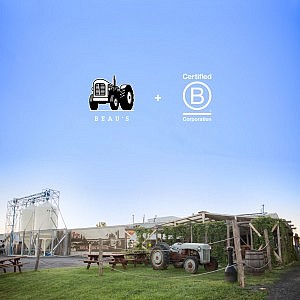Documentary: Canada’s First B Corp Brewery March 19, 2018
After six or seven years of working hard to create a company culture that values honest consideration for the environment and its local communities, Beau’s co-founder and CEO, Steve Beauchesne, was trying to find a way to make official all of the family-run brewery’s environmentally and socially conscious business practices.
“There was a sense right from the get-go,” says Beauchesne, “that beer tastes better when you can feel good about drinking it.”
In the modern marketplace, in which ‘green-washing’ and social-washing are prevailing concerns, when a company’s business model truly adheres to a mandate of being environmentally sustainable and socially conscious, it must find a way to qualify that.
Enter B Lab, the governing body (with branches all over the world) that evaluates and certifies potential Benefit Corporations or B Corps: companies, like Beau’s, that wish to measure their successes on matters of environmental and social accountability.
In October 2013, Beau’s became the first brewery in Canada to achieve B Corp status, a third-party certification of a company’s commitment to maintaining high ethical standards, rather than just the bottom line.
“We serve people who use business as a force for good,” says B Lab Canada director Joyce Sou. “Our vision is that one day all companies would compete to be best for the world, not just best in the world — so that we would see a more shared and durable prosperity.”
What is a B Corp? According to the B Corporation website: “B Corps are for-profit companies certified by the nonprofit B Lab to meet rigorous standards of social and environmental performance, accountability, and transparency.”
In order to receive B Corp certification, a company must be assessed by B Lab, which asks each applicant questions about how they treat their employees, their company’s environmental impact, governing structure, etc. The applicant’s answers to these questions are graded to B Lab’s rigorous standards, and a minimum score of 80 is needed for certification. A perfect score is 200.
Consumers can look to B Corp certification as a quantifiable measurement that a company can be trusted; that its claims of sustainability and socially conscious business practices are not false.
“The third party certification is one way that we like to bridge that trust gap and allow consumers to say, ‘Okay, I know I can trust this company, I don’t have to worry, or do extra work to try and figure out what they’re actually doing,’” says Sou.
Some examples of noteworthy B Corps include Hootsuite and BDC in Canada, and Ben and Jerry’s and Patagonia in the United States.
“It’s kind of like Fairtrade certification, or organic certification,” says Beauchesne. “But instead of dealing with one aspect of your product, it deals with all aspects of your company. In this world where a company will do one really good thing and really trumpet it while doing a hundred really bad things, B Corp is the antidote to that.”
B Corporations can be found in many industries. What these companies have in common is a desire to, through their day-to-day operations, have a positive impact on people and the planet. They are committed to providing their employees with a healthy work environment; to green initiatives such as organic ingredients and clean energy; to creating stronger communities; and to being transparent and accountable as a business.
For a list of Beau’s sustainability initiatives, visit beaus.ca/sustainability.
For its efforts to be a force for good in the world, and specifically with its employee ownership initiative, in 2016 B Lab awarded Beau’s the ‘Built To Last Award’ at the B Corp #BInspired Awards.
Visit this link to learn about Brew the Change, a beer Beau’s created collaboratively in 2016 with 10 fellow B Corp breweries to raise awareness of and spark interest in the B Corp movement.
Share:Original Source Here

